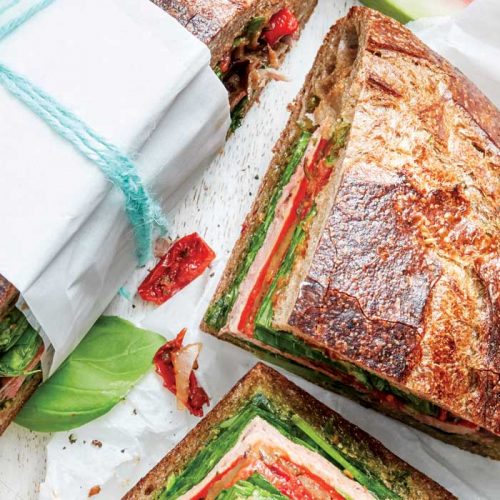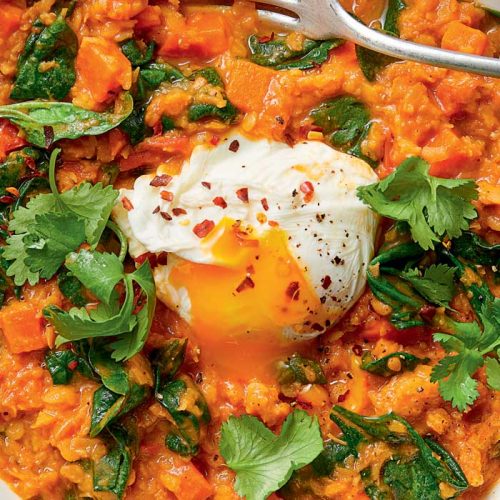
For years, people have consumed tea for medicinal reasons. But is there any science to back the claims about the benefits of tea? Dietitian Caitlin Reid reviews the evidence.
Green tea: ‘Burns fat’
Truth: Many people claim that green tea increases fat burning – and this claim is supported by research. A review of recent studies in this area has found that catechin, a polyphenol antioxidant in green tea, increases the amount of kilojoules burnt and activates a higher rate of fat oxidation (fat burning), which may help with weight loss. Green tea may also play a role in reducing the risk of cardiovascular disease and some forms of cancer. Although more research is needed, there’s certainly no harm in adding a cup or two to your daily diet.
Chamomile tea: ‘Is calming’
Truth: Chamomile tea, brewed from dried flower heads of the chamomile plant, has been used traditionally for calming and medicinal purposes for many years. Science has proven that there may be some basis for this, as it contains several health-promoting flavonoids. In fact, animal studies have found chamomile tea has a potent anti-inflammatory action and may provide both cholesterol-lowering benefits and relief from anxiety and stress. But studies in humans are so far limited, so there’s no definitive answer yet.
Oolong tea: ‘Helps you lose weight’
Truth: Oolong, a popular type of Chinese tea, is often advertised online as a weight-loss tool, but only minimal scientific evidence supports this. A recent Japanese study found consuming 8g of oolong tea per day for six weeks promoted a minor weight loss of 1kg in six weeks in 70 per cent of severely obese participants, 64 per cent of obese participants and 66 per cent of overweight participants. However, the same study also found high triglyceride and high blood cholesterol levels were decreased, so there may be benefit in drinking oolong after all.
Chai tea: ‘Healthier than other teas’
Truth: Chai tea (black tea flavoured with Indian spices) has seen a large boost in popularity recently, and is often thought of as healthier than other teas. No studies using chai tea are yet available, but experts believe chai tea may offer the same health benefits as black tea, as well as the health benefits of the spices it contains. But make sure you’re drinking the traditional, loose-leaf blend – many cafés use a sugary, processed, chai-flavoured syrup or powder, not the traditional tea.
Peppermint tea: ‘Aids digestion’
Truth: Peppermint tea, often drunk for its reputed digestive benefits, is one of the most widely consumed, single-ingredient herbal teas in the world. Studies have shown that peppermint oil and its constituents can produce a relaxing effect on the gastrointestinal tract; reducing abdominal pain, flatulence and diarrhoea. They may also play a role in pain relief. But clinical trials on peppermint tea are absent, so while there’s no harm in drinking it, studies have yet to prove that it actually works.
What about black tea?
Black tea isn’t often thought of as having health benefits, but research shows it’s just as good as the rest. Enjoying at least three cups of black tea each day has been found to offer protective benefits against heart disease, which research suggests is due to the flavonoid antioxidants found in tea. These flavonoids have been shown to reduce the oxidation of bad LDL cholesterol (a mechanism thought to contribute to hardened arteries), as well as improve the elasticity and flexibility of blood vessels. Many studies have also shown a significant increase in blood antioxidant capacity one hour after moderate amounts of tea (one to six cups a day).
Tea and herbal tea: What’s the difference?
Traditional tea comes from the leaves and leaf buds of the Camellia sinensis plant. Black, green, oolong and white tea are all made from this plant. Herbal teas, on the other hand, are derived from other plants and can contain a mix of leaves, flowers, roots, twigs, spices and fruits – so they don’t contain any caffeine.
More articles on tea: Tea: Is it bad for you? and Everyday choices: Kombucha or iced tea?
Article sources and references
- Dylan O’Neill Rothenberg, Caibi Zhou, and Lingyun Zhang. A Review on the Weight-Loss Effects of Oxidized Tea Polyphenols. Molecules. 2018 May; 23(5): 1176. Published online 2018 May 14. doi: 10.3390/molecules23051176https://www.ncbi.nlm.nih.gov/pmc/articles/PMC6099746/
- Diane McKay, et al. A Review of the bioactivity and potential health benefits of chamomile tea (Matricaria recutita L.). July 2006Phytotherapy Research 20(7):519-30 DOI: 10.1002/ptr.1900https://www.researchgate.net/publication/7151230_A_Review_of_the_bioactivity_and_potential_health_benefits_of_chamomile_tea_Matricaria_recutita_L
- Diane L McKay, Jeffrey B Blumberg. A review of the bioactivity and potential health benefits of peppermint tea (Mentha piperita L.) Phytother Res . 2006 Aug;20(8):619-33. doi: 10.1002/ptr.1936.https://pubmed.ncbi.nlm.nih.gov/16767798/
- Rasa Troup, et al. Effect of Black Tea Intake on Blood Cholesterol Concentrations in Individuals with Mild Hypercholesterolemia: A Diet-Controlled Randomized Trial. J Acad Nutr Diet. 2015 Feb; 115(2): 264–271.e2. Published online 2014 Sep 27. doi: 10.1016/j.jand.2014.07.021https://www.ncbi.nlm.nih.gov/pmc/articles/PMC4312726/
www.healthyfood.com













